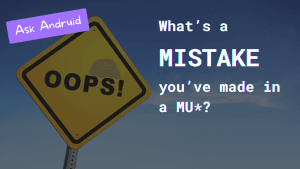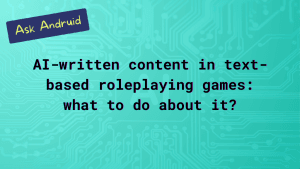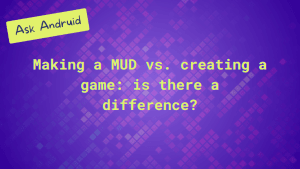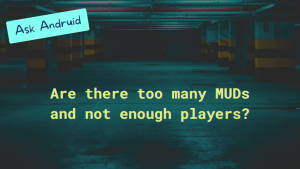Dear Andruid,
I’ve started building an area for a MUD, but I’m not sure how long the room descriptions should be. I asked around and some people want short descriptions while others want long and detailed ones. How do I know what’s right? I don’t want to spend a long time working on these descriptions only to find out I did them wrong.
– Uncertain Builder
Thoughts on how long to make room descriptions
Dear Uncertain Builder,
Great question! When it comes to room descs, you’re not the only one who is unsure about how much to write. Just this weekend, I saw a builder ask a similar question in a game’s Discord channel, and the topic pops up on Reddit at least once or twice every year.
The (unsatisfying but perhaps expected) short answer is that “it depends.”
However, I’ll give you a place to start and instructions to help you find your specific answer.
Both in the MU* world and in the business world, people often jump right past the strategy (the what and why) and into the tactics (the how).
For example, “How many lines should I write for my room descriptions?” is a tactical question.
The answers to tactical questions tell you how to do things, but they don’t tell you why you should do them that way.
To determine the right room description length (and many other important details) for your game, you’ll want to start by thinking strategically.
The question you should be asking first
Answer the following question. Whether you’re just a helper or the game’s creator, you need to be able to answer this question:
Who is the game’s target audience?
By target audience, I mean the players you want playing your game.
Before you start writing, you need to know who you’re writing for. This will inform many, many “why” questions. Why the room descriptions should be 1-2 sentences instead of 2-4, for example.
A mistake some games make is that they try to be the ideal game for every player, and so they end up being the ideal game for almost no one. It’s the same in marketing and business.
On the other hand, if you know who your target audience is, and you create the best game for them, you’ll have absolutely nailed it for that group of people, plus you’ll have checked off many boxes for all the other players whose ideal game shares characteristics with yours (even if it’s not a perfect fit).
So you need to know: who are you creating your game for? What will appeal to them?
Are you creating an immersive roleplaying game that caters to storytellers? A casual PvE game meant for people who enjoy questing and crafting? A PvP arena-style game built for players who like fast-paced combat?
Don’t worry about what everyone on Reddit thinks. Everyone has a personal preference, and you’re never going to satisfy them all. So just concern yourself with the types of players you want playing your game and what they will enjoy.
How the answer impacts your strategy and tactics
Once you know who you’re writing for, both the whys and hows become much clearer.
For example:
If your target audience is people who like fast-paced PvP, you may want to stick to shorter descriptions (1-2 sentences) that focus on what’s immediately important to them, such as key exits, threats, or resources.
If your target audience loves to explore immersive areas, you may want to write a little more (2-4 sentences) and focus on important landmarks, bits of lore, and details that call attention to secret paths and hidden areas for them to explore.
But don’t stop at room length. Write down a description of your target audience, and then use that to start a builder’s style guide for your game.
A builder’s style guide is an important document where things like description length and writing style are defined. It’s a set of instructions that current and future builders can follow to create a cohesive and consistent world.
One of the best reasons to have such a guide is that it answers common building questions, which saves everyone time.
And lastly, don’t be afraid to experiment and get feedback from some of your target players. You may want to do this individually or in a test area, outside the usual discussion channels, as this will make it easier to see their first impressions.
Also, when asking for feedback, don’t get too caught up in personal preference or how players rationalize their likes/dislikes. Instead, look for patterns in the way they respond.
For more tips on how to find and keep players, check out this marketing guide and this guide to improving player retention.
파이팅!
– Andruid
Speaking of players, this week is Player Appreciation Week! Don’t forget to thank your game’s fans for sticking with it – especially the ones who contribute by organizing events or keeping other players engaged.






Leave a Comment